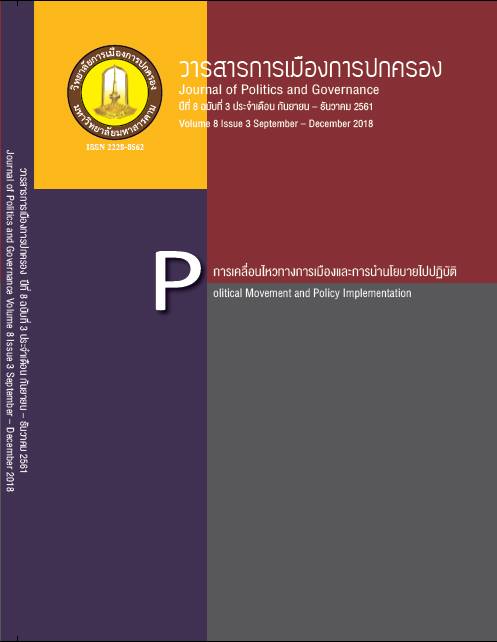The Politics of the Myths in the Construction of Truth Regime of the Minangkabau
Main Article Content
Abstract
Minangkabau people are one of 300 ethnic groups of Indonesia, where is the 4th most populous country in the world. Moreover, Minangkabau society is the largest maternal descent society in the world. This article aims to study 3 Minangkabau literatures or legends – the Legend of Minangkabau (the buffalo winner), the Legend of Alexander and his 3 sons, and the Legend of King Atitaya Woraman – using the postmodernism methodology. The article’s assumption was “Minangkabau people founded the discourse as the truth with those 3 legends for firmness of their historical narrative”. The results of the study are as follows: because the content of the legend cannot be separated from the author’s archives. It, the content not only is reflecting the ethical conflict, but also are reproducing the senses of the winner and, in the meantime, also condemned the losers. And at the time when the legend was published, the Legend of Minangkabau connoted to nationalism; The Legend of Alexander and his 3 sons and the Legend of King Atitaya Woraman were not only represented a historical narrative about their first king, but also were used to forget their narrative which told them that they came from the lower ethnical origination than the Srivijayan. The legends also connoted, at that time, the international relations in Southeast Asian ancient states and the influence of Indian culture. So, a case study of 3 Minangkabau legends showed, in the past, the construction of historical narrative, based on the proud of their ethnicity and nation which is set as a better cultural, political and governmental value than other ancient states. But when the legends are reproduced in the present time, they are used as a political foundation and identity building for the nation state, nation, and nationalism.
Article Details
References
ปรานี วงษ์เทศ. (2543). สังคมและวัฒนธรรมในอุษาคเนย์. กรุงเทพฯ: ศิลปวัฒนธรรม.
ผ่องพันธุ์ มณีรัตน์. (2529). มานุษยวิทยากับการศึกษาคติชาวบ้าน. กรุงเทพฯ: มหาวิทยาลัยธรรมศาสตร์.
ศิราพร ณ ถลาง. (2545). ชนชาติไทยในนิทาน: แลลอดแว่นคติชน และวรรณกรรมพื้นบ้าน. กรุงเทพฯ: มติชน.
อานันท์ กาญจนพันธุ์. (2543). ความคิดทางประวัติศาสตร์และศาสตร์ของวิธีคิด : รวมบทความทางประวัติศาสตร์. กรุงเทพฯ: อมรินทร์.
ฮอลล์, ดี. จี. อี. (2549ก). ประวัติศาสตร์เอเชียตะวันออกเฉียงใต้: สุวรรณภูมิ-อุษาคเนย์ภาคพิสดาร เล่ม 1. แปลโดย วรุณยุพา สนิทวงศ์ ณ อยุธยา และคณะ, บรรณาธิการโดย ชาญวิทย์ เกษตรศิริ. กรุงเทพฯ: มูลนิธิโครงการตำราสังคมศาสตร์และมนุษยศาสตร์ และมูลนิธิโตโยต้าประเทศไทย.
ฮอลล์, ดี. จี. อี.. (2549ข). ประวัติศาสตร์เอเชียตะวันออกเฉียงใต้: สุวรรณภูมิ-อุษาคเนย์ภาคพิสดาร เล่ม 2. แปลโดย วรุณยุพา สนิทวงศ์ ณ อยุธยา และคณะ, บรรณาธิการโดย ชาญวิทย์ เกษตรศิริ. กรุงเทพฯ: มูลนิธิโครงการตำราสังคมศาสตร์และมนุษยศาสตร์ และมูลนิธิโตโยต้าประเทศไทย.
Hadler, J. (2003). Rusli Amran and the Rewriting of Minangkabau History. Kyoto Review of Southeast Asia. Retrieved June 29, 2017, from https://kyotoreview.org/ issue-3-nations-and-stories/rusli-amran-and-the-rewriting-of-minangkabau-history
Josselin de Jong, P. E. de. (2012). Minangkabau and Negri Sembilan: socio-political structure in Indonesia. Springer Science & Business Media.
_______. (ed.). (1988). Unity in diversity: Indonesia as a field of anthropological study. Dordrecht: Foris.
Kato, T. (1977). Social Change in a Centrifugal Society: the Minangkabau of West Sumatra. Southeast Asia Program, Cornell University.
Unny, Govindan. (1994). Kinship Systems in Southeast Asia: A Study. New Delhi: Vikas Publishing House.
King, Victor T. (ed.). (1992). The Rejang of Southern Sumatra. Special Issue, Occasional Paper No. 19, Centre for South-East Asian Studies, University of Hull, p.16-17
Vlekke, B. H. M. (1959). Nusantara, A History of Indonesia. Bruxelles: Les Editions A. Manteau, S.A.


